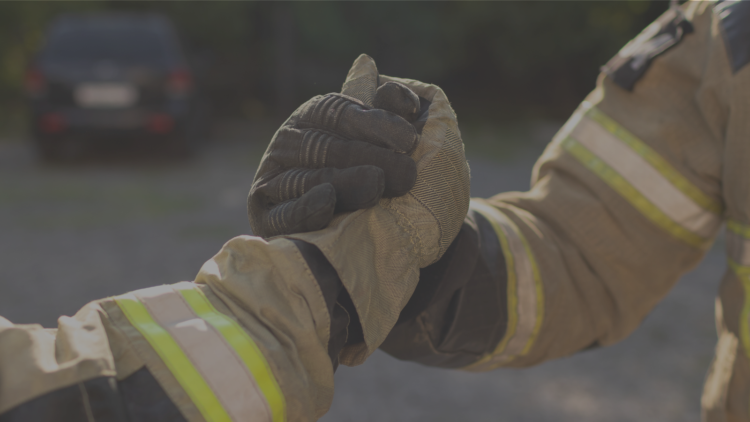Written by Lt. Kevin Pfluger
In the fire service, we pride ourselves on strength, resilience, and the ability to face any challenge head-on. But some of the toughest battles aren’t fought on the fireground—they’re internal, emotional, and deeply personal.
Whether it’s the aftermath of a traumatic call, struggles with a marriage, alcohol misuse, or the weight of mental health challenges, firefighters are not immune to the trials and mental toll it all takes.
That’s why building proactive peer support relationships is not just a good idea—it’s a necessity.
Trust Is Built Before It’s Needed
One of the most overlooked elements of mental wellness in the firehouse is the importance of relationships between coworkers. The trust to talk openly doesn’t start the moment someone is struggling—it starts long before, in the day-to-day interactions, shared meals, and mutual respect that grows with time. Here is where the brotherhood is built and the bonds grow.
When trust is already in place, a firefighter feels more comfortable and is far more likely to approach a peer when something is wrong. A bad call, tension at home, or personal substance struggles are easier to bring up in a supportive environment.
But if we wait until someone is in crisis to reach out, we’ve waited too long.
Leadership Through Connection, Not Control
There was a time when leadership in the fire service was based on rank, authority, and often, intimidation. The old-school mentality of “toughen up” or “figure it out” may have had its place, but it doesn’t foster the kind of environment where firefighters feel safe being vulnerable and honest with themselves and each other. Respect doesn’t have to come from fear—it should come from consistency, fairness, and approachability.
The most effective leaders today know how to listen as well as they give orders. They build relationships that make their people feel seen and supported. When someone is struggling, they know they can turn to leadership not for judgment, but for help.
Sometimes Talking Is Enough
Not every problem needs a professional solution. Sometimes, what a person needs most is simply someone willing to sit down, listen, and say, “I hear you.” That kind of peer support can’t be forced—it has to be earned. And it starts with checking in on each other regularly, asking the right questions, and creating space for honest conversations.
With that being said, it’s also critical to recognize when more structured help is needed—and to have resources ready.
Consider Building an In-House Peer Support Team
One powerful step fire departments can take is to develop their own internal peer support team. These are trained members of the department who are equipped to provide emotional support, help identify when someone needs additional resources, and connect individuals with professional help when necessary.
An in-house team has the advantage of being made up of people who understand the unique culture, challenges, and stressors of that specific department. Trust is easier to establish when support comes from someone who’s been in the same boots, fought the same fires, and understands the daily grind.
Training can be provided through a variety of programs tailored for first responders, and having a designated peer team sends a clear message: it’s okay to talk, and we have people here ready to listen.
Tools and Resources: Next Rung
In addition to internal efforts, it’s important to be aware of external resources. Next Rung is a nonprofit organization dedicated to supporting first responders through peer-to-peer connections and access to professional counseling. What makes Next Rung especially valuable is that their peer support team is made up entirely of current or former first responders—who understand the job because they’re lived it too.
These trained volunteers are on call 24/7, ready to talk to anyone who needs help. Whether it’s after a tough call, during a personal crisis, or just needing someone to listen, Next Rung offers confidential, judgment-free support from someone who truly “gets it.”
If the need goes beyond peer support, Next Rung can also connect individuals with licensed counselors and mental health professionals who specialize in working with first responders. This ensures that any next step is taken with someone who understands the job and its emotional toll.
Need to talk? Contact Next Rung:
Website: www.nextrung.org
Text “SUPPORT” to 1-833-NXT-RUNG (698-7864)
Instagram: @nextrung
Available 24/7, confidential, and free
Consider printing this information and posting it in your station or including it in new hire packets.
HERE'S WHAT IT COMES DOWN TO
The fire service is built on teamwork and trust.
If we can rely on each other in a burning building, we should be able to rely on each other outside of it too. Building proactive relationships—long before the moment of crisis—means creating an environment where every firefighter knows they’re never alone.
Lead with empathy. Speak with honesty. Listen like it matters. Whether it’s in the way we show up every day, through a peer support team, or by connecting with resources like Next Rung, we all have a part to play in making sure the people we serve alongside feel supported—every step of the way.
About the Author:
Lt. Kevin Pfluger is an 18-year veteran of the fire service. In addition to his place on Mercedes Textiles' team, he runs the Dagum training cadre – which hosts the Dagum Texas Fire Conference and many other specific training courses. He is also a member of the Bearers of the Oath (GA) and Ambassadors of the Craft (CA) cadres. A true member of the brotherhood, Kevin is on the peer support team for Next Rung, a charity providing frontline mental health service, and he also serves on the UL 19 technical committee for 0219-Fire Hose.
For the past four years, Kevin has been an integral part of our KYH crew, bringing a deep passion for the job and a strong technical knowledge of our products. But more importantly, he exemplifies the absolute best of the fire service. We're proud to know and work with him.

